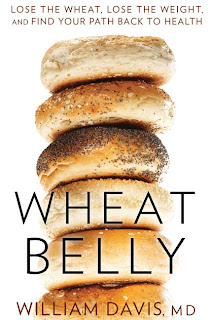 Towards the end of 2012, I followed the elimination diet from Dr John Mansfield's book, The Six Secrets of Successful Weight Loss (read all about it here). In the first stages of the elimination process you eat from a selection of very healthy foods whilst avoiding all foods that commonly cause problems for people. Then you gradually reintroduce the potential problematic items, observing the effects as you go.
Towards the end of 2012, I followed the elimination diet from Dr John Mansfield's book, The Six Secrets of Successful Weight Loss (read all about it here). In the first stages of the elimination process you eat from a selection of very healthy foods whilst avoiding all foods that commonly cause problems for people. Then you gradually reintroduce the potential problematic items, observing the effects as you go.The diet is based around the idea that after you have eliminated problem foods for a while, when you reintroduce them your sensitivity will show up. As you only introduce one thing at a time, you can be sure what has caused the problems. This diet looks in particular at weight gain - food sensitivities apparently often show up as a sudden increase in weight, within a few hours of eating the food.
During the first phases of the diet I felt amazing. Within a few days all my aches and pains went away, my head was clearer, I lost 5kg and 10cm from my waist, I had more energy than I have had in years. Inflammation in my shoulder, which had previously caused an incredibly painful trapped nerve, went away too, which totally amazed my massage therapist.
Then I started to reintroduce the foods that commonly cause problems. A few things raised some questions, but when I retested there was nothing. Dr Mansfield himself looked at my results and confirmed that there must be a sensitivity to something - he suggested I retest dairy, which I did, but found nothing.
Meanwhile I was gradually starting to feel like it did before the elimination diet, and although before the diet this was the norm, after the diet I found myself obsessed. Why did I feel so good when I was eating a restricted diet, and what was it that made it all go wrong?
After reading back over all my notes and looking at the raw data I began to wonder if it might be wheat. Although I didn't gain any weight when I reintroduced wheat, I did make notes of several other 'side effects' (see original post) such as sore eyes, a brick in my stomach, and less energy. Also, although wheat didn't cause the weight gain which was anticipated if there was a sensitivity, my weight loss did actually stop at that point, despite the 'diet' continuing for several weeks.
 So, about a month ago I decided to cut down on my wheat and see what happened. Within just two days my energy levels were noticeably improved. After a couple of weeks with a very low wheat consumption I decided I felt good enough for it to be worth a trial of having no wheat at all. I bought William Davis' Wheat Belly book and read with awe. If you are still trying to find the motivation to try a wheat free diet, read this book!
So, about a month ago I decided to cut down on my wheat and see what happened. Within just two days my energy levels were noticeably improved. After a couple of weeks with a very low wheat consumption I decided I felt good enough for it to be worth a trial of having no wheat at all. I bought William Davis' Wheat Belly book and read with awe. If you are still trying to find the motivation to try a wheat free diet, read this book!I decided to give the wheat free life a 4 week trial, but within a week I knew I wouldn't go back.
During my research I have also leaned about the Paleo Diet and The Whole 30 . I bought the book It Starts with Food which is an excellent read and is giving me lots of great ideas for wheat free cooking and beyond, as is the Wheat Belly Cookbook. Doing The Whole 30 may well be my next step, to identify once and for all which grains (and maybe other foods) give me grief and which don't, but for now, mostly due to a couple of planned social dining events which would make the whole30 very tricky, I am just focussing on wheat, and getting used to a wheat free life.
It is very reassuring to see so many commonalities between the Paleo Diet, The Wheat Belly Book, It Starts with Food, and the Six Secrets to Successful Weight Loss, (and also with the Atkins Diet) leading me to believe that although popular health advice still encourages you to eat a low fat diet full of whole grain goodness, this may well be leading people in the wrong direction.
Lets see!









No comments:
Post a Comment